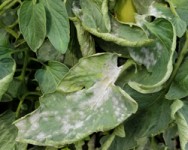Event Details
Date
August 23, 2018
Time
4:00 PM - 7:00 PM plus light supper and networking
Location
Cornell Lake Erie Research and Extension Laboratory
6592 West Main Rd
Portland, NY 14769
Cost
This event is free.
Host
Cornell Vegetable ProgramElizabeth Buck
585-406-3419
email Elizabeth Buck
EVENT HAS PASSED
3rd Annual Vegetable Pest Management Field Day
August 23, 2018
Research trial results, cultural technique showcases, and effective varieties and treatments for organic and IPM production are the meeting focus. We will highlight current disease issues, their detection & spread based on this season's climate conditions, and management tools available to reduce yield impacts. Sessions will also be offered on pest identification and control options. Regional equipment dealers and industry representatives will be invited to display equipment and new technology.
2.25 DEC credits available in categories 1a, 10 and 23
AGENDA:
4:00 Welcome and overview (meet inside lab) -- Judson Reid, Cornell Vegetable Program
4:05 Biofumigation and reduced tillage for control of Phytophthora capsici -- Justin O'Dea, Washington State University Extension
Phytophthora Blight caused by the pathogen P.capsici is a devastating disease of vine crops, peppers and other annual vegetable crops. Justin will discuss research examining Phytophthora management through biofumigation with cover crops and reduced tillage. Also covered will be soil health benefits of using brassica cover crops and reduced tillage.
4:50 Industry update, water/snack break and head outside to trial plots.
5:10 Evaluation of vegetable varieties for organic disease control; Integrated pest and mite management -- Judson Reid and Elizabeth Buck, Cornell Vegetable Program
Judson and Elizabeth will lead the group through trials that demonstrate powdery and downy mildew management in cucumbers with varietal resistance. A similar trial with tomatoes will cover Early & Late Blight management. Integrated insect and mite management options will also be covered. There will also be a demonstration of 4 specialty spinach varieties.
5:50 Industry updates
6:00 What do biofungicides contribute to management of powdery mildew and white mold? -- Amara Dunn, NYS IPM program
6:50 Q&A, Industry updates
7:00 Adjourn for light refreshments and networking
Attendees will present an ID and record their certification ID number, print name and sign the Recertification Training Roster. The roster will be secured by a Cornell Vegetable Program representative and only the attendees who sit for the entire course will be awarded a certificate.



































